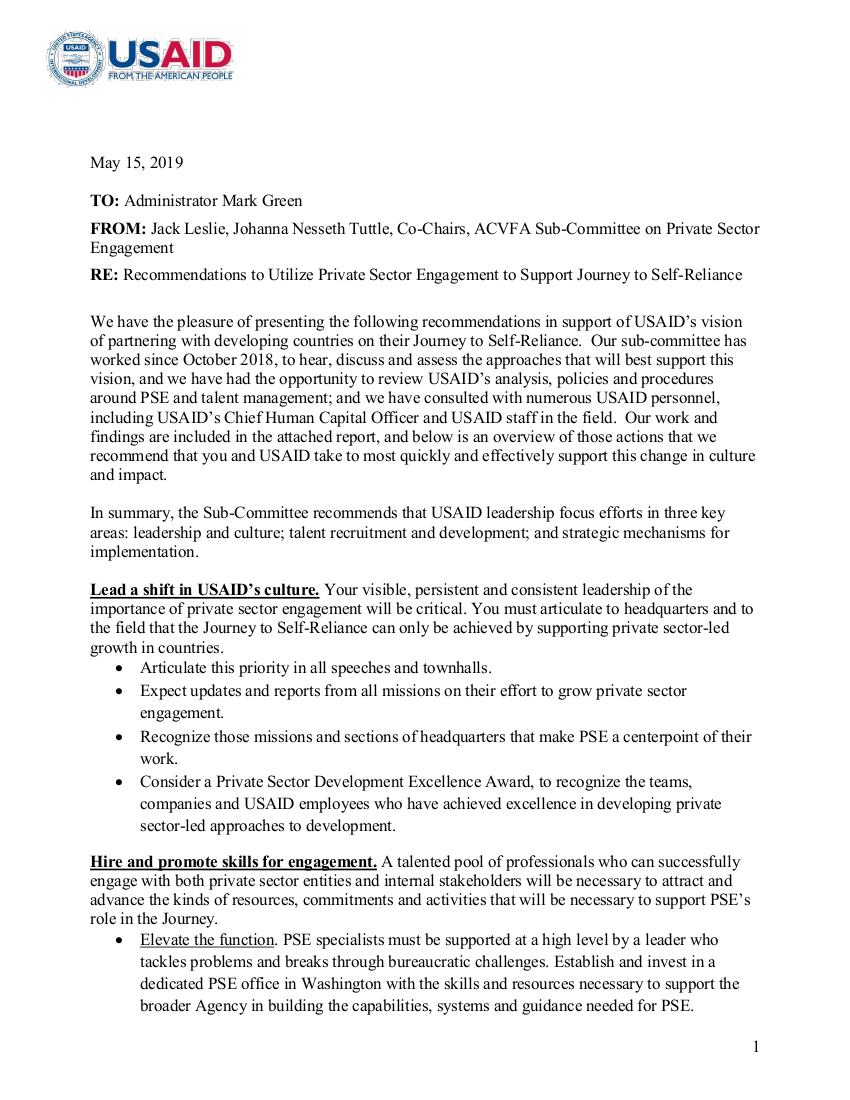Speeches Shim
May 15, 2019
TO: Administrator Mark Green
FROM: Jack Leslie, Johanna Nesseth Tuttle, Co-Chairs, ACVFA Sub-Committee on Private Sector Engagement
RE: Recommendations to Utilize Private Sector Engagement to Support Journey to Self-Reliance
We have the pleasure of presenting the following recommendations in support of USAID’s vision of partnering with developing countries on their Journey to Self-Reliance. Our sub-committee has worked since October 2018, to hear, discuss and assess the approaches that will best support this vision, and we have had the opportunity to review USAID’s analysis, policies and procedures around PSE and talent management; and we have consulted with numerous USAID personnel, including USAID’s Chief Human Capital Officer and USAID staff in the field. Our work and findings are included in the attached report, and below is an overview of those actions that we recommend that you and USAID take to most quickly and effectively support this change in culture and impact.
In summary, the Sub-Committee recommends that USAID leadership focus efforts in three key areas: leadership and culture; talent recruitment and development; and strategic mechanisms for implementation.
Lead a shift in USAID’s culture. Your visible, persistent and consistent leadership of the importance of private sector engagement will be critical. You must articulate to headquarters and to the field that the Journey to Self-Reliance can only be achieved by supporting private sector-led growth in countries.
- Articulate this priority in all speeches and townhalls.
- Expect updates and reports from all missions on their effort to grow private sector engagement.
- Recognize those missions and sections of headquarters that make PSE a centerpoint of their work.
- Consider a Private Sector Development Excellence Award, to recognize the teams, companies and USAID employees who have achieved excellence in developing private sector-led approaches to development.
Hire and promote skills for engagement. A talented pool of professionals who can successfully engage with both private sector entities and internal stakeholders will be necessary to attract and advance the kinds of resources, commitments and activities that will be necessary to support PSE’s role in the Journey.
- Elevate the function. PSE specialists must be supported at a high level by a leader who tackles problems and breaks through bureaucratic challenges. Establish and invest in a dedicated PSE office in Washington with the skills and resources necessary to support the broader Agency in building the capabilities, systems and guidance needed for PSE. Designate a senior PSE leader for this unit with the stature to build trust and maintain credibility at all levels of USAID, from procurement officers to the Assistant Administrators and Mission Directors. Empower the PSE leader to drive change, and define tangible ways to hold him or her and all of Agency leadership accountable for demonstrating progress in implementing the PSE Policy.
- Hire differently. Seek out people with curiosity and generalist skills and knowledge, who are seasoned problem-solvers and engagers. Look for backgrounds in consulting, finance and stakeholder engagement.
- Incentivize and motivate talented PSE officers. Don’t treat them differently from other specialists, but ensure that they are equally recognized for their skills, capabilities and successes. Given the limitations of incentive structures within the context of the U.S. Government, whereby it is difficult to provide financial incentives, USAID should focus on other types of incentives to encourage and hold all staff accountable for advancing PSE. Options to consider include recognition and integration of PSE into required career path steps that lead to senior executive roles within the Agency.
Utilize strategic mechanisms for implementation. A range of outlets and vehicles will be needed to deepen USAID’s work with the private sector.
- Leverage and enable the local private sector. U.S. companies have significant investments globally; many rely on local businesses to fulfill contracts, provide employees and produce products. Working to build the local private sector is critical to the Journey; and to U.S. interests.
- Capitalize on new opportunities for development through financing. Build talent within Missions to utilize the new Development Finance Corporation.
- Update USAID’s procurement processes. Improve understanding of the details, and ensure that USAID personnel, including PSE officers and Contracting and Agreement Officers, are able to utilize the process more comprehensively in order to support engagements, coinvestments and partnerships; ensure that missions have guidance on their remit.
- Cultivate the Business Media. As the USAID Administrator, you should consider conducting a media tour to conduct targeted interviews and editorial engagements with key partners to discuss the role of, and opportunities for U.S. business, in the Journey to Self Reliance. In addition, encourage your own Public Affairs team and those in Missions and Offices to cultivate contacts and relationships in the business media, especially in their geographic areas and/or targeted industries.
Thank you for your interest in this topic. The private sector creates most jobs in developing countries and is a critical partner in the Journey to Self-Reliance. We believe that these steps will help USAID capitalize on the role the private sector can play


Comment
Make a general inquiry or suggest an improvement.